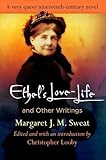"Ethel's Love-Life" and Other Writings / Margaret J. M. Sweat; ed. by Christopher Looby.
Material type: TextSeries: Q19: The Queer American Nineteenth CenturyPublisher: Philadelphia : University of Pennsylvania Press, [2020]Copyright date: ©2021Description: 1 online resource (344 p.)Content type:
TextSeries: Q19: The Queer American Nineteenth CenturyPublisher: Philadelphia : University of Pennsylvania Press, [2020]Copyright date: ©2021Description: 1 online resource (344 p.)Content type: - 9780812297409
- 813/.3 23
- online - DeGruyter
| Item type | Current library | Call number | URL | Status | Notes | Barcode | |
|---|---|---|---|---|---|---|---|
 eBook
eBook
|
Biblioteca "Angelicum" Pont. Univ. S.Tommaso d'Aquino Nuvola online | online - DeGruyter (Browse shelf(Opens below)) | Online access | Not for loan (Accesso limitato) | Accesso per gli utenti autorizzati / Access for authorized users | (dgr)9780812297409 |
Browsing Biblioteca "Angelicum" Pont. Univ. S.Tommaso d'Aquino shelves, Shelving location: Nuvola online Close shelf browser (Hides shelf browser)

|

|

|

|

|

|

|
||
| online - DeGruyter Bootlegged Aliens : Immigration Politics on America's Northern Border / | online - DeGruyter Nuclear Country : The Origins of the Rural New Right / | online - DeGruyter In Good Faith : Arabic Translation and Translators in Early Modern Spain / | online - DeGruyter "Ethel's Love-Life" and Other Writings / | online - DeGruyter Subscription Theater : Democracy and Drama in Britain and Ireland, 1880-1939 / | online - DeGruyter The Visigothic Kingdom in Iberia : Construction and Invention / | online - DeGruyter Perspectives on Fair Housing / |
Frontmatter -- Contents -- Introduction -- Ethel’s Love- Life: A Novel (1859) -- Verses (1890) -- Essays -- A Chapter on Novels (1856) -- Charlotte Bronté and the Bronté Novels (1857) -- The Friendships of Women (1868) -- The Novels of George Sand (1870) -- George Sand (1876) -- Notes
restricted access online access with authorization star
http://purl.org/coar/access_right/c_16ec
In a series of lengthy letters, the unsettled and unruly Ethel Sutherland writes to an initially unnamed and ungendered correspondent, and patiently discloses the troubled history of her past romantic attachments to both men and women. Not until the third letter does she reveal that her correspondent is Ernest, the man to whom she is engaged to be married. Wanting to make him understand how all of her past loves are included and sublimated in her love for him, she especially wants to explain how "women often love each other with as much fervor and excitement as they do men"; and although this love is curiously "freed from all the grosser elements of passion, as it exists between sexes," nevertheless it "retains its energy, its abandonment, its flush, its eagerness, its palpitation, and its rapture."Margaret Jane Mussey Sweat (1823-1908), a native of Portland, Maine, and wife of a United States congressman, published Ethel's Love-Life in 1859. The book is sometimes credited as an early—even the first—"lesbian" American novel, but such a label, Christopher Looby observes in his Introduction, somewhat misrepresents what is distinctive and surprising about the book. Ethel's Love-Life confounds our received binary distinctions between the spiritual and the carnal and, indeed, between the sexual and the nonsexual—the boundaries between such categories being not nearly as well-policed at the time as they later became. It is here reprinted, along with Sweat's Verses (1890) and five of her published essays, on Charlotte Brontë, George Sand, the contemporary novel, and the friendships of women.
Mode of access: Internet via World Wide Web.
In English.
Description based on online resource; title from PDF title page (publisher's Web site, viewed 25. Jun 2024)


